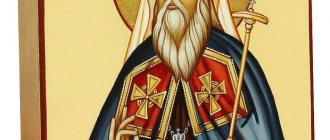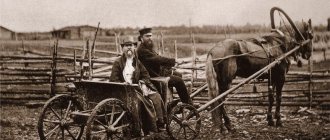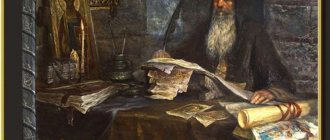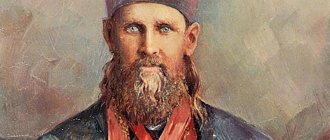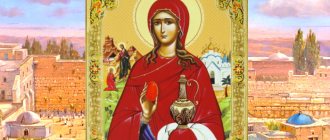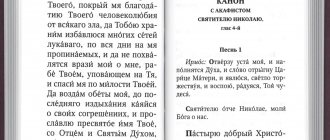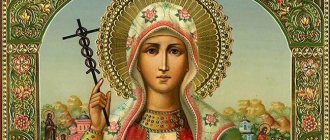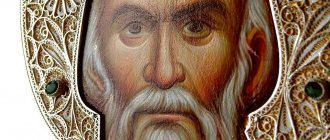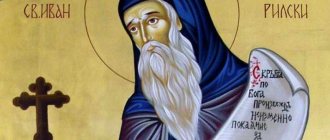Reception days – Wednesday and Friday
But the servants did not tell the patriarch about every needy person. Then the patriarch appointed reception days: Wednesday and Friday, and commanded that every person who came on these days with any request should be admitted to him.
The reception took place in the church: the patriarch sat with his assistants near the entrance to the church and listened to the people. At the same time he said:
“After all, I myself ask the Lord to hear me, and, talking with Him in prayer, I ask Him for what I want. Why shouldn’t I listen to my neighbor?”
But there were days when no one came. Then the patriarch became upset and went home. The assistants asked: what is he upset about? The Patriarch answered: “Today I have not brought anything to God for my sins.”
Should you give alms to well-dressed people?
One day the servants told St. John that in the crowd of beggars who came with a request to the patriarch, there are well-dressed girls, but they are asking for alms. The servants asked: should they serve or not serve?
The Patriarch replied: “If you are truly Christians, then serve as Christ commanded - despite the faces, without asking about life. We are not giving what is ours, but what is Christ’s.”
But all St. John did not convince, there were still doubters: why serve this to those who are clothed and not dying of hunger?
In response, the patriarch shared his mystical experience:
“When I was sixteen, one night I dreamed of a beautiful maiden with an olive wreath on her head. The girl touched me and woke me up. Waking up, I saw that she was standing before me no longer in a dream, but in reality, and asked: “Who are you, how dare you come to me?”
The girl replied: “I am the eldest daughter of the Great King and the first among His daughters. If you make me your friend, then I will ask you great grace from the King, because no one has such strength and boldness from Him as I do.”
To those who did not understand everything, the patriarch explained: “Mercy came to me in the form of a maiden. After all, it was only out of His mercy that Christ came to save people, and therefore he who wants mercy from God must himself be merciful to others.”
Icon of John the Merciful
In the Orthodox tradition of icon painting (Byzantine and Old Russian style), St. John is depicted as an old man with straight gray hair, a thin, wise face and a long, pointed beard. He is dressed in a patriarchal cassock with crosses. The Saint holds the Gospel or a scroll in his hands.
On icons John was depicted both individually and among selected Saints, as, for example, on the icon “Our Lady of the Sign” he is depicted together with St. Nicholas and Simeon. The icon dates back to the 15th century. and is located in the Tretyakov Gallery.
Examination
Saint John the Merciful.
Fragment of a miniature from the minology of Vasily the Second. Fragment One day Saint John went to the hospital to visit the sick (he went to hospitals several times a week). On the road, a beggar asked him for alms. The Patriarch handed him six silver coins. Taking the coins, the wanderer left. But then, wanting to experience the saint’s generosity, he changed clothes and, going along a different path, met the saint again. John and again asked for money.
John again ordered that six silver coins be given to him. The observant servant guessed the beggar and warned the patriarch. But the patriarch, pretending not to hear the remark, again gave it to the beggar. Then the beggar changed his clothes again and asked for alms for the third time. The servant again hinted to the patriarch about deception, but the patriarch again gave it to the beggar.
John's Royal Path
After the death of his wife and children, John fully felt the grief of loss and injustice. But the godly young man found his healing and calling in compassion and helping those in need. He remembered that he had always wanted to be a monk and a faster before his unplanned marriage. He began to lead an increasingly ascetic way of life. Although John was not a monk, he lived a very Ionic life, spending time in prayer and helping the disadvantaged. He gave most of his property to charity.
Although John the Merciful, doing good deeds, did not crave calling and rewards, the fame of him and his deanery quickly spread and reached the highest spiritual ranks. So, in 609, the patriarch of the Alexandria Church, Feodor, died. Then Emperor Heraclius made the fateful decision to honor with the rank of patriarch a man without spiritual education or monastic vows, but with a string of good deeds and a persistent faith in the justice of God.
Apology to the altar boy
Two altar servers for one sin were punished by Patriarch John with temporary excommunication from Communion. One of them repented, and the other was offended. Having learned about this, the patriarch wanted to talk to him again to calm him down, but forgot.
One Sunday, getting ready to serve the liturgy, St. John remembered that altar boy who was angry with him, as well as the words of Christ spoken by Him in the Gospel: “If you bring your gift to the altar and remember that your neighbor has something against you, leave your gift and go, first make peace with to your neighbors."
The Patriarch left the altar, found that altar boy and on his knees asked him for forgiveness.
The altar boy was so amazed that he immediately softened and also asked for forgiveness from the patriarch. The Patriarch went to serve the liturgy, and the altar boy soon became a priest.
Relics of the Saint
John's body was initially buried in the temple at Amathunta and was transported to Constantinople. And in 1249, most of the relics were transferred to a monastery in the city of Venice, where they still rest in the Roman Catholic Church of St. John in Bragor. More pieces of the relics were placed in caskets in temples on Mount Athos. In 1632, part of the relics was transferred to St. Martin's Cathedral in Pozsony (now Bratislava). In Bratislava, the chapel of St. John the Merciful was built for the remains of the Saint.
In Moscow in 1645, a particle of the relics was brought to Archimandrite Macarius as a gift from the Patriarch of Alexandria Ioannikios. Then in 2007, with the blessing of Metropolitan Kirill, a particle of the relics was transferred through a representative of the Patriarch of Venice to the Church of St. John the Merciful, which is located in the city of Otradnoye, Leningrad region. In the church in Otradnoye you can still venerate the relics of St. John.
Why was all of Alexandria amazed?
Alexandria.
Fragment of a medieval map One hotel owner in Alexandria cursed the nephew of Patriarch John. He complained to his uncle. John said: “He, the wicked one, dared to dishonor my nephew! I bear witness to God that I will take revenge on the offender and deal with him in such a way that all of Alexandria will be amazed!
The nephew immediately calmed down. Seeing this, St. John said: “Beloved son!
If you want to be my relative, then be ready to endure not only insults, but even more, and for God’s sake forgive your neighbor everything.
Do you want to be noble? Then seek nobility not by blood, but by virtue. True nobility is decorated not so much by the glory of ancestors, but by good deeds!”
And then the patriarch ordered that the annual church tax not be taken from the person who insulted his nephew, allowing him to live freely. And all Alexandria was amazed.
Election of John as Patriarch of the Church of Alexandria
John accepted the rank of patriarch against his wishes. He wanted to continue to live modestly, praying for the destinies of the disadvantaged, helping them with good deeds. But having realized that by accepting the post of patriarch, he could do more good and good, he ascended to the highest spiritual throne.
His rule was not indifferent or inert. He showed himself to be a merciful, but proactive and fair church leader. He made it his goal to rid his flock of the Monophysite heresy. Instead of endless discussions about Divine and Human principles, Saint John the Merciful devoted himself to fulfilling the commandments of God and helping those in need.
Another large-scale initiative of John was the census of the poor. It included all the poor, homeless, 7.5 thousand people in total. Free daily meals and shelter were provided for them. The Patriarch helped not only the poor in Alexandria. He also spiritually and materially supported refugees from Syria, which was captured by the Arabs.
But John the Merciful had a special love for monks and novices; he ordered the construction of a special hotel and cells for them in Alexandria.
Who will win?
One day, a rich nobleman friend came to the saint and accidentally saw that the patriarch’s bed was covered with a holey blanket. The nobleman sent the patriarch a new blanket, worth thirty-six gold pieces, asking him to cover himself with it.
The Patriarch, thanks to the nobleman, promised, and honestly covered himself with a blanket for one night. And then he said to himself (probably the cell attendant heard and wrote it down for history):
“How many people are there in this city who have neither corner nor food! And they, despite the need, believe in God and thank Him! And who am I? Is it difficult for me to thank God, I have been rich since childhood, I have lived in love and honor all my life.
And with all this, there is also this blanket. What will God tell you? So have you served your neighbors? They starved and you lived luxuriously? After all, our Christ did not come to be served, but to serve people Himself. And so he commanded his priests. And you?"
This is what the patriarch said, and in the morning he ordered the blanket to be sold and with this money to buy clothes for the poor. But when the blanket was being sold, the same nobleman happened to pass by, found out that it was for sale, bought it again and again sent it to John.
John took the blanket with gratitude and sent it off to sell again, with the words: “Let’s see who gets tired first: I’m the one to sell, or my donor is the one to give.” They did this up to five times, and each time all the proceeds from the sale of the rich blanket went to the poor. The nobleman was the first to surrender.
Horrible dream
One of the canals near Alexandria.
Aquatina from the album “Views of Egypt” (early 19th century) The patriarch had one very stingy bishop. His name was Troil. And here is St. John invited Troilus to go with him to the hospital for a round. And he said: “Father Troilus! Here is an opportunity for you to comfort those in need by giving them alms.”
Troilus, ashamed to appear stingy, began to give alms to everyone against his will and spent a lot of gold. But when he came home, he was so upset by the waste that he fell ill. And Saint John had just invited him to dinner. Troilus said that he was ill.
Guessing the cause of this illness, John, taking with him as much gold as Troilus had spent in the hospital, went to visit him. Coming to him, he said:
“I brought you the gold that I borrowed from you in the hospital, take it, and give me a note that you are giving me the reward from the Lord that was intended for you for the distributed gold.” Seeing the gold, Troilus was so happy that he immediately recovered, and immediately wrote: “Merciful God! Grant a reward to my lord John, Patriarch of Alexandria, for the thirty liters of gold that I distributed to the poor, because he returned my gold to me.”
Having received the note, John began to pray for his bishop. And then at night Troil saw in a vision a beautiful palace with the inscription: “The House of Bishop Troil.” But before he had time to enter there, some majestic and formidable man appeared, looking like a royal servant, and said:
“The Lord ordered that this inscription be erased and that it be written that this is the house of John, Patriarch of Alexandria, who bought it for himself for thirty liters of gold.
Troilus woke up from grief and ran to Patriarch John with a story about a strange dream. The Patriarch consoled him, interpreting the dream as a warning. From that time on, Troilus reformed and became poor-loving.
Why charity funds sometimes end up lost at sea
Henry Moore, “The Stormy Sea”
One day, thirty ships belonging to the Church of Alexandria and loaded to the brim with goods were caught in a storm. All goods were lost. Having lost his property intended for charity, Saint John said the words that righteous Job once said:
“The Lord gave, the Lord took away. Blessed be the name of the Lord." Which roughly means: “God knows best how to dispose of good things, but you can also think about the reasons for what happened.”
When to St. They came to John to console him for his losses, the patriarch replied:
“I myself am to blame for the destruction of church property, because if I had not been exalted in my mind for giving great alms, then the property would not have perished in the sea.”
I became proud, giving not my own, but God’s. And God, wanting to humble me, allowed such impoverishment, because poverty humbles a person. Now I myself realize that because of pride I lost my reward from God and caused a great loss to the poor, because those whose food was lost will starve. But not for my sake, but for their own sake, the Lord will not leave the poor and will give them everything they need.
And it’s true: as soon as Patriarch John repented, God sent him twice as much as before.
Prayer
Saint John of God, merciful protector of the orphans and those in adversity! We resort to you and pray to you, as the quick patron of all who seek consolation from God in troubles and sorrows. Don’t stop praying to the Lord for everyone who flows to you with faith! You, filled with Christ’s love and goodness, have appeared as a wonderful palace of the virtue of mercy and have acquired for yourself the name “Merciful.” You were like a river, constantly flowing with generous mercies and abundantly feeding all those who thirst. We believe that after you moved from earth to heaven, the gift of sowing grace increased in you and that you became an inexhaustible vessel of all goodness. By your intercession and intercession before God, create “all kinds of joy,” so that all who come running to you may find peace and tranquility: grant them consolation in temporary sorrows and help in the needs of everyday life, instilling in them the hope of eternal rest in the Kingdom of Heaven. In your life on earth, you were a refuge for everyone in every trouble and need, for the offended and ailing; not a single one of those who came to you and asked you for mercy was deprived of your grace. Likewise now, reigning with Christ God in heaven, show to all who worship before your honorable icon and pray for help and intercession. Not only did you yourself show mercy to the helpless, but you also raised the hearts of others to the consolation of the weak and to the charity of the poor. Move even now the hearts of the faithful to intercede for the orphans, comfort the mourners and reassure the needy. May the gifts of mercy not become scarce in them, and moreover, may peace and joy in the Holy Spirit dwell in them - to the glory of our Lord and Savior Jesus Christ, forever and ever. Amen.
Kindness and mercy often look like weakness and lack of self-confidence. Saint John, by his example, teaches Christians love of humanity, care for others, and patience. Not to make hasty decisions, not to judge, to do good - these qualities John cultivated in himself throughout his life, his life encourages all Christians to follow his example.
Don't believe your eyes
Alexandria.
Image from a medieval chronicle. St. John was a monk, and monks have one ascetic rule: not to believe your eyes. In the sense that if your eyes see something that forces you to condemn, it is better not to believe your eyes than to condemn.
The validity of this rule was once demonstrated by St. John's life itself. One monk walked around Alexandria for several days with a very young and beautiful girl.
Seeing this, people decided that the monk was depraved to the point of shamelessness - he was not even embarrassed to show himself with a woman. And they complained to the patriarch.
He ordered both to be seized and locked in prison (one by one). As night fell, the monk appeared to the patriarch in a dream, showed him his body, wounded from beatings, and asked:
- Is this what you wanted, sir? Is this how you learned from the Apostle to shepherd the flock of Christ? Believe me: you are deceived!
In the morning, the patriarch gave the order to bring the monk, wanting to see if he looked like the one who had appeared to him in a dream. The monk came with difficulty, as he could hardly move from his wounds. The Patriarch wanted to look at the wounds, and when the monk began to take off his clothes, St. John saw that the monk was a eunuch. Thus, having become convinced that the monk had been slandered, and that he himself had been deceived, St. John excommunicated the slanderers from the Church for three years, and asked the monk for forgiveness: “I have sinned before God and before you. But why did you so carelessly give rise to seducing people?”
The monk replied:
- Lord, I will tell the truth. A girl approached me on the street, at first I was about to run away from her, but she said that she was Jewish and wanted to be baptized and then enter a monastery. Then I baptized her, and then helped choose a convent for her.
After listening to the monk, the patriarch remarked: “We, the damned, don’t even know how many secret righteous people God has.”

